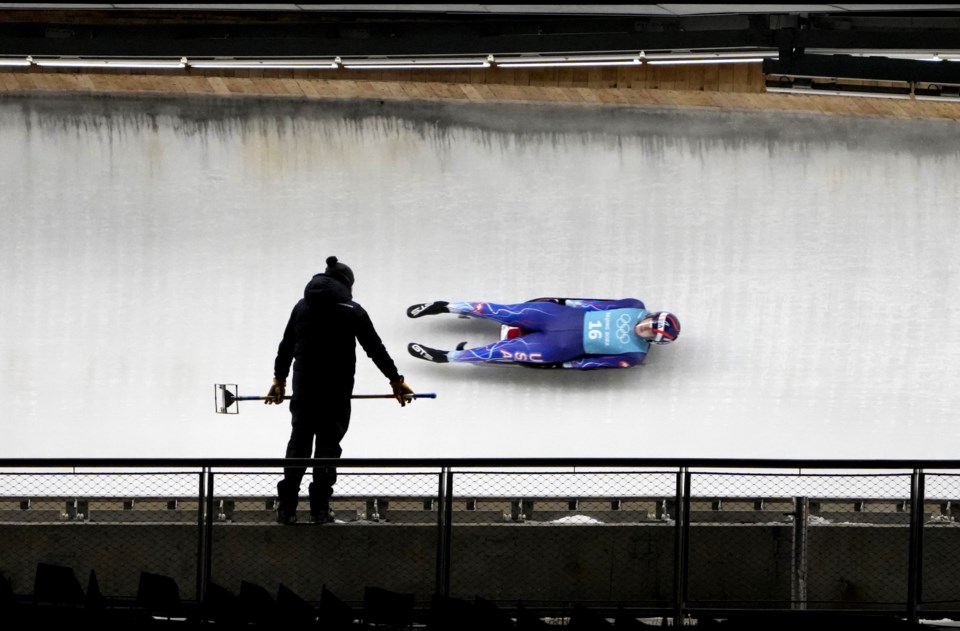BEIJING (AP) ŌĆö Earplugs may be USA Luge veteran Summer BritcherŌĆÖs secret weapon at the Beijing Olympics.
That has nothing to do with noise.
The start to a luge race is critical: Sliders, wearing gloves with tiny spikes on the bottom of their fingertips, dig into the ice as they paddle at the start and look to build every bit of momentum possible to start propelling them down the track.
But Britcher has a broken middle finger on her left hand, so sheŌĆÖs going with a new plan at the start. SheŌĆÖll dig her knuckles into the ice as she paddles, using earplugs ŌĆö the soft, pliable, silicon kind ŌĆö inside her gloves to serve as padding.
ŌĆ£Good innovativeness,ŌĆØ Britcher said.
Hey, itŌĆÖs the Olympics. Whatever it takes.
The womenŌĆÖs event starts Monday with the first two runs of the four-run competition; medals get handed out Tuesday. Britcher is one of 11 women who won at least one medal in World Cup singles competition this season, and having that many athletes know their way to the podium suggests the womenŌĆÖs event at the Beijing Games could be as wide-open as any in Olympic history.
ŌĆ£I want to slide at least to the level that IŌĆÖm capable of,ŌĆØ Britcher said. ŌĆ£And I think that if I can pull that together ... all of these training runs have felt really good, IŌĆÖve got great energy right now just being at the Olympics, and if I can slide to that level and slide to what I know IŌĆÖm capable of, then no matter what my result IŌĆÖll be happy.ŌĆØ
The level sheŌĆÖs capable of is, well, elite.
SheŌĆÖs a five-time winner on the World Cup circuit. SheŌĆÖs come home from the World Cup with at least one medal in each of the last seven seasons. And these are her third Olympics, an achievement only five American womenŌĆÖs luge athletes have previously reached.
But Britcher also knows her last two seasons havenŌĆÖt been her best. Part of that can be attributed to how USA Luge skipped half of last season while finding ways to deal with the pandemic, but Britcher knows that even in difficult times she can be better.
ŌĆ£IŌĆÖve had a tough two years, like everyone,ŌĆØ Britcher said. ŌĆ£I donŌĆÖt think IŌĆÖve been sliding to the best of my abilities. I saw a really cool promo video that somebody did with some interviews and stuff and some clips of previous footage and the commentators were talking. It was during Pyeongchang and they were saying all this like, ŌĆśOh, look at her slide. SheŌĆÖs not slider she was four years ago.ŌĆÖ And I was watching myself slide and I was like, ŌĆśYou know what? I havenŌĆÖt been sliding like that.ŌĆÖŌĆØ
Britcher was only 11th in the World Cup standings this season, though she probably cost herself as many as five spots by the way she had to finish the schedule. A January crash in Sigulda, Latvia, is where she broke the finger, and her results were basically nonexistent after that. The irony is that Britcher broke her finger because she tried adhering to the cardinal rule of luge crashes ŌĆö that being not to let go of the sled, for fear that it may break.
The force the sled generated when it hit the wall wound up snapping her finger, her first broken bone in 16 years of luge.
ŌĆ£And then I also broke my sled in three places,ŌĆØ Britcher said.
The sled is fine. The finger isnŌĆÖt. But Britcher came up with the earplugs idea ŌĆö she bought them for plane rides ŌĆö after trying to paddle with her knuckles and bruising them in the process. Some USA Luge athletes paddled with their knuckles in the 1980ŌĆÖs and 1990ŌĆÖs, but most everyone in the world has used their fingertips since.
The good news for Britcher is that the Yanqing Sliding Center track has a very steep start. Some tracks might see sliders taking five or six paddles; Britcher figures she can get going here with just three.
ŌĆ£IŌĆÖm willing to push through any amount of pain, but IŌĆÖm not willing to put myself in a situation where IŌĆÖm going to further damage this or create all kinds of bigger problems,ŌĆØ Britcher said. ŌĆ£Four years ago, I would have said, ŌĆśI donŌĆÖt care if I need 10 surgeries, IŌĆÖm going to paddle as hard as I can,ŌĆÖ but IŌĆÖve definitely kind of realized that IŌĆÖll have this body forever. And even though itŌĆÖs just a finger, youŌĆÖd be surprised by how much I canŌĆÖt do by taking away one little finger.ŌĆØ
___
More AP Winter Olympics: https://apnews.com/hub/winter-olympics and https://twitter.com/AP_Sports
Tim Reynolds, The Associated Press

